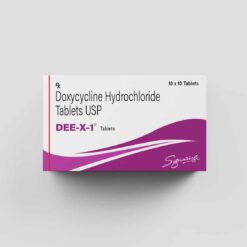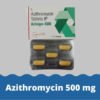Azithromycin 500 mg
$70.00 – $480.00
Azithromycin 500 mg is an antibiotic that is commonly prescribed by doctors for the treatment of several types of bacterial infections. It belongs to the macrolide group of antibiotics that are known to work by stopping bacterial growth. It is important to note that azithromycin does not work for viral diseases like flu or the common cold. It also won’t serve as a painkiller. It is taken orally, preferably an hour before or 2 hours after a meal, or as prescribed by the doctor.
Description
| Active Ingredient | Azithromycin |
| Type | Bacterial Infections |
How does Azithromycin 500 mg Work
Azithromycin is a type of macrolide antibiotic that works by inhibiting bacterial protein synthesis, thereby putting an end to bacterial growth. Upon ingestion, the drug is delivered to the site(s) of infection via phagocytes and other cells. There, it enters the bacterial cells and binds to the 50S subunits of their ribosomes. This stops the mRNA translation, i.e., prevents the bacteria from synthesizing protein and causes death or stunted growth of the bacteria.
Uses of Azithromycin 500 mg
The FDA-approved drug, Azithromycin 500 mg is commonly prescribed for the treatment of mild-moderate bacterial infections –
- Middle ear and chest infections
- Pneumonia
- Chronic obstructive pulmonary disease (COPD)
- Strep throat or tonsillitis
- Sinus infections
- Urethritis and cervicitis
- Typhoid/malaria fever
- Some sexually transmitted disorders like gonorrhea
Recommended Dosage
Being a prescription medicine, you should take Azithromycin 500 mg as per your doctor’s advice. A 500 mg tablet per day is the usual recommendation for sinus infections, tonsillitis, COPD exacerbations, skin infections, and bronchitis. But depending on your condition, your doctor might also prescribe one Azithromycin 500 mg tablet for the first day, followed by one 250 mg dose each on days 2 and 3. The medicine can be taken an hour before consuming food or 2 hours after eating. Swallow the tablet whole with a full glass of water. You must not skip doses and finish the full course to get complete results.
Note that Azithromycin 500 mg is strictly recommended for use by adults and children (above 6 months of age) are often given lower doses (10 mg/kg of body weight).
Missed Dosage
The incorrect use of antibiotics often leads to the development of drug-resistant bacterial strains which renders the antibiotics useless against those particular strains. Therefore, taking the entire course of Azithromycin is crucial. Do not miss a dose even if you feel better. Missing a dose may either not improve your condition or worsen it. In case you’ve forgotten to take a dose, take it as soon as you remember. But if the next scheduled dose is due soon, skip the missed dose and only take the scheduled one. Do not take 2 doses in close succession.
Overdose
First of all, avoid taking more than the recommended dose of Azithromycin at all costs. If you have accidentally taken too much Azithromycin at once, it may cause liver damage or heart palpitations. Immediately call your doctor or the emergency helpline number to get instant aid.
Important Advisory
Before you consider taking Azithromycin 500 mg, tell your doctor if you’re allergic to the drug. Also, let your doctor know if you have any of the following health conditions-
- If you have myasthenia gravis, this drug might worsen the symptoms
- If you’ve ever had an allergic reaction to any macrolides or ketolides
- If you suffer from cystic fibrosis
- If you have contracted hepatic diseases like hepatitis
- If you suffer from renal impairment
- If you suffer from heart problems like abnormal heart rhythm (including QT prolongation)
- If you have had a stem cell transplant (after being diagnosed with diseases like blood or lymph node cancers)
- If you’re pregnant or breastfeeding, consult your doctor before taking this drug
Side effects of Azithromycin 500 mg
Azithromycin may have some side effects, though it is a well-tolerated drug. Some common symptoms include-
- Nausea
- Headache
- Loss of appetite
- Dizziness
- Diarrhea
- Abdominal pain
These side effects are generally mild and go away within a few days or weeks. However, if they’re severe, you should consult your doctor.
Some more severe and dangerous side effects which manifest mostly as a result of an overdose are-
- Tiredness or weakness
- Dark urine
- Loss of appetite
- Severe upper-abdomen pain
- Yellowing of your skin and/or whites of your eyes
These show an adverse impact on your liver.
- Fainting
- Fluttering in your chest
- Difficulty breathing while sleeping
These indicate QT prolongation which may cause irregular heart rhythm.
- Trouble breathing
- Rashes or blisters
- Swollen lips, face, tongue, or throat
These show a severe allergic reaction.
Other than the ones listed above, a few other serious side effects can be blurred eye vision and deafness. Contact your doctor as soon as you start noticing any of these symptoms because they can be highly dangerous.
Interaction With Other Drugs
Azithromycin 500 mg oral tablets can interact with other medicines, herbs, or vitamin supplements that one might be consuming. An interaction changes the way the drug works, often reducing its efficiency and even causing harm to the patient. To avoid any such possibility, you should tell your physician about all the medicines and supplements you take. Some drug interactions for Azithromycin include-
- Antiviral drugs used to treat HIV like Nelfinavir
- Blood thinners like Warfarin
- Digoxin (used for treating heart problems)
- Colchicine (used to treat gout)
- Antacids containing aluminum or magnesium
- Ergot derivatives
- Cyclosporin
- Cisapride
- Dronedarone
- Hydroxychloroquine
- Disopyramide
- Sotalol
This is not an exhaustive list, so you should talk to your doctor about all the other medicines you take.
Interaction With Alcohol
Although there is no direct evidence to show that alcohol interacts with Azithromycin, one should still avoid consuming both together.
Storage Instructions
Follow these guidelines to ensure that the tablets remain usable for a long time-
- Keep them in their original packaging to avoid contact with air, light, and moisture.
- Store the package at room temperature (20-22 degrees celsius).
- Keep it away from damp, moist places but also keep them away from direct sunlight.
- Keep them at a place away from the reach of children.
Frequently Asked Questions (FAQs)
1. How does Azithromycin work?
Ans- It stops bacterial protein synthesis and causes the bacteria to die, thereby curing your infection.
2. How soon will I get relief?
Ans- Generally, mild infections get better within a few days but severe infections might take weeks. In any case, take the full course of medicine as prescribed by your doctor.
3. Does Azithromycin 500 mg cause thrush?
Ans- If you’ve been taking the drug for a long time, there is a possibility of you developing oral thrush. Ask your physician for help in case you face this issue.
4. How is Azithromycin different from amoxicillin?
Ans- Although both drugs kill bacteria, they do so differently. Azithromycin is a macrolide antibiotic that kills bacteria by stopping protein synthesis. Amoxicillin belongs to the beta-lactam class of drugs which work by inhibiting cell wall synthesis in the bacteria thereby killing them. They can be used to treat more or less the same diseases. Lastly, Azithromycin is generally taken once per day for 1 to 5 days, whereas Amoxicillin is taken twice or thrice a day for 10-14 days.
5. Will Azithromycin reduce my fertility?
Ans- There is no study to show that this drug reduces fertility but you might want to talk to your physician before taking it.
References
- https://www.ncbi.nlm.nih.gov/pmc/articles/PMC4203592/
- https://pubmed.ncbi.nlm.nih.gov/8396082/
- https://www.ncbi.nlm.nih.gov/pmc/articles/PMC3918299/
- https://pubchem.ncbi.nlm.nih.gov/compound/447043
Disclaimer
HisBlue is not a substitute for professional medical care or advice from your doctor. The health information on the HisBlue website is general and provided for your information only. We have ensured our content is accurate and current, with reviews by expert doctors. However, we cannot guarantee its accuracy or timeliness. This information is not meant to replace the diagnosis, treatment, or judgement of your doctor or another qualified healthcare provider.
Disclaimer
HisBlue is not a substitute for professional medical care or advice from your doctor. The health information on the HisBlue website is general and provided for your information only. We have ensured our content is accurate and current, with reviews by expert doctors. However, we cannot guarantee its accuracy or timeliness. This information is not meant to replace the diagnosis, treatment, or judgement of your doctor or another qualified healthcare provider.
Related products
Antibiotics
$70.00 – $425.00
Antibiotics



This will be my third time ordering from hisblue. The customer service is very professional and honest. The team member name Joseph is the best! My delivery is fast, and the products are awesome. I will continue to order from this company!